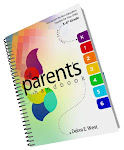Howard Gardners Multiple Intelligences: Part 2
Below is part 2 of the article on Howard Gardner's Multiple Intelligences written by Thomas R. Hoerr, Ph.D. Makes sure you read the entire article to get all the information. I will be posting parts of the article this week.
Most children have a number of different intelligences and learning styles and can be engaged in a variety of ways. If you don't see a strong preference for particular toys or games, it means that your child has more than one primary intelligence or that she isn't old enough to have developed a strong predilection. In most cases, you can begin to see a preference for particular styles at around age 2. By then your child will most likely respond best to specific activities and types of experiences.
Most children have a number of different intelligences and learning styles and can be engaged in a variety of ways. If you don't see a strong preference for particular toys or games, it means that your child has more than one primary intelligence or that she isn't old enough to have developed a strong predilection. In most cases, you can begin to see a preference for particular styles at around age 2. By then your child will most likely respond best to specific activities and types of experiences.
Respecting individual intelligences and learning styles means offering your child a variety of ways to learn. This doesn't mean that you should shy away from helping him master certain skills — almost anything can be taught in a way that works well for a specific intelligence. When you identify and respond to your child's intelligence and learning style, you help him approach the world on his own terms. Playing to his strengths can make mastering new skills less frustrating — and can help him develop a lifelong love of learning.
Many ways to learn
One of the benefits of the multiple intelligence theory is that it offers parents many options — if a child isn't responding to a particular activity, there are many other approaches to try. Once you have a sense of your child's learning style, take a look at your home environment and routine to see how well it works for the way she learns. If you find that your child gravitates toward music, make sure that she has instruments available. Try playing music throughout the day and using songs as a way to encourage her enjoyment of different activities (a special song for doing the dishes or going grocery shopping can go a long way!). If she seems to have a powerful physical, or bodily-kinesthetic, intelligence, remember that creating fun hopping or jumping games to play while you're waiting in lines or at the store can help to make these tough times easier.










0 comments:
Post a Comment